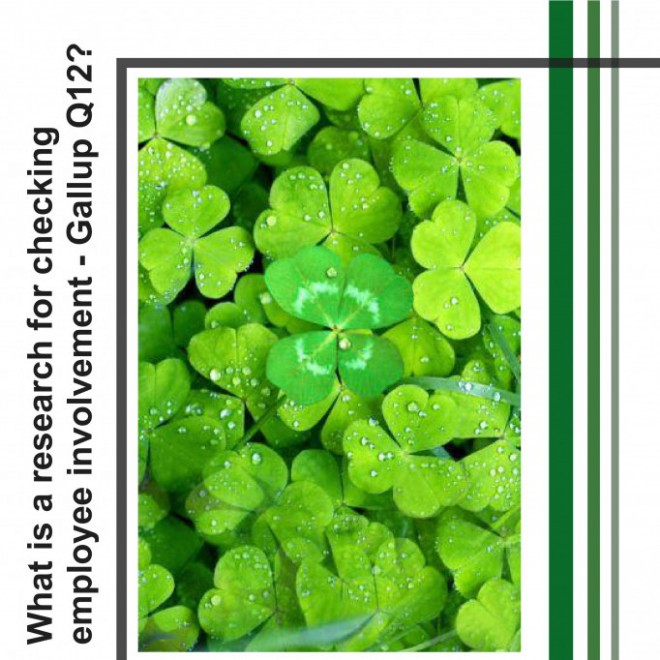Do you have the impression that your employees do not give their best? Many companies do not know how to motivate and engage their employees to work better and more efficiently. That is why we created the research about the Gallup test - which is considered to be the method with the highest accuracy and reliability.
Only 13 percent employees around the world are involved in their work, while enjoying satisfaction and guaranteeing the development of the company. The rest do not put effort into or even contest it, according to Gallup's State of The Global Workplace report.
The authors of the report indicate that companies that invest in employees receive in return their higher involvement and, as a result, even three times higher profits than companies with low involvement. The report describes three types of employees. The first of these are those engaged who work with passion and enjoy it. There are only 13% of such employees; however, they are the most valuable for the company - they introduce innovations and develop them.
The second type is Non Engaged Employees. They constitute the majority - 63 percent of the total. The authors of the report write that such people do not put energy and passion into work, waiting only for the end of the day. - These 63 percent during the working day are "sleepwalking".
The third group are employees contesting work. They are dissatisfied with work and busy demonstrating this dissatisfaction. In addition, they undermine the achievements of other people involved in the work.
The Gallup Institute has been interviewing over a million employees for over 25 years. They asked about various aspects of work in order to identify the most important issues determining the answer to the question: what is a good workplace?
After conducting many interviews, the most important questions were picked up, which will collect the most valuable answers:
1. Do you know what is expected of you at work?
2. Do you have the materials and equipment to do your work right?
3. At work, do you have the opportunity to do what you do best every day?
4. In the last seven days, have you received recognition or praise for doing good work?
5. Does your supervisor, or someone at work, seem to care about you as a person?
6. Is there someone at work who encourages your development?
7. At work, do your opinions seem to count?
8. Does the mission/purpose of your company make you feel your job is important?
9. Are your associates (fellow employees) committed to doing quality work?
10. Do you have a best friend at work?
11. In the last six months, has someone at work talked to you about your progress?
12. In the last year, have you had opportunities to learn and grow?
The above questions help determine the quality and attractiveness of the workplace. The authors of the study said that if someone can create such conditions that employees answer yes to all twelve questions, it means that they can create the perfect workplace.
The Gallup Institute's goal was to find a way to assess good jobs that attract the best and most talented employees. Employees answered the questions posed on a scale of 1 to 5, where 1 meant "I absolutely disagree" and 5 "I totally disagree". The most important goal of a manager who is interested in having a professional and committed team should be striving to receive "5" for all questions.
What is the research survey checking employee involvement - Gallup Q12?
What is the purpose of sending a dozen or even hundreds of surveys to your employees to check their involvement, if it is possible to get even more adequate and precise results by asking only 12 simple questions?
Gallup researchers have spent decades writing and testing hundreds of questions just to make them as accurate as possible. They wanted them to be formulated in an appropriate manner and in an adequate order so that employees' commitment could be checked as accurately as possible.
Their research resulted in the so-called Gallup Q12 survey - a collection of 12 questions that measure the most important elements included in the work of people employed in a given company.
Gallup Q12 survey questions:
Q12 questions are listed in a hierarchical group - from the basic employee needs to the development needs of people employed in the company. According to the Gallup group: "12 elements tell us that employees must be focused and free of stress. They should have the right materials to perform their duties, want to care for them and appreciate their commitment and work.
They want to be heard, understood, want to inspire trust and trust their supervisor themselves and want to get challenges adequate to their knowledge and skill level so that they can test their knowledge. Here are the items described one at a time to provide additional clarity to the questions asked during the Gallup Q12 survey.
Question number 1. - "I know what is expected of me at work."
Employees should know exactly what is expected of them at the workplace, in a given position. Because they want to focus accurately on their responsibilities, be able to deliver the best results and perform them meticulously.
Question number 2. - "I have materials and the right equipment to perform my duties in the workplace."
There is nothing more frustrating for an employee than the fact that he could do his job more accurately and better if he only had the right tools for it.
Good equipment is the basis for doing your job. Adequate software or hardware programs may be needed, depending on the type of work that can maximize employee productivity.
Question number 3. - "I have the ability to perform my duties as best I can at work."
People who are able to focus on their strengths in the workplace are 6 times more involved in the performance of their duties.
Question number 4. - "In the last 7 days I received praise or any recognition for my job well done."
People who receive recognition and praise for their achievements increase their individual productivity and commitment. They are more likely to stay in their company, receive higher loyalty and satisfaction ratings from customers.
Question number 5.- "My supervisor or anyone at work seems to care for me."
A caring environment is one where everyone feels safe enough to experiment, question certain things, share information, and support each other.
Question number 6. - "There is someone at work who encourages me to develop."
People cannot succeed alone. They learn and develop in response to the encouragement of others. That is why employees need a manager who will motivate them properly.
Question number 7. - "My opinions in the workplace are important, others are important to them."
Employees want to know that their contribution to work is important and that they affect the environment in which they work. This feeling creates a greater sense of integration among employees and strengthens their self-esteem.
Question number 8. - "My company's mission or purpose makes me feel that my work is important."
When people believe what their employer is doing and feel a kind of relationship between the work they do and their personal mission, they are more likely to stay in the organization and feel that they are an integral part of something bigger than themselves.
Question number 9. - "My colleagues or employers are involved in carrying out their work in the best quality."
All employees must be in an environment of mutual trust and respect for their efforts and results, because the person who goes the worst in the team sets its standards in some way.
Question number 10. - "I have my best friend at work"
This is one of the most controversial Q12 questions. The best predicate for better well-being and commitment at work is not what people do, but who they do it with. Having a best friend at work significantly improves their results.
Question number 11. - "Over the past six months, someone at work has been informing me of my progress."
Feedback can help employees better understand themselves and give them a clear perspective on how their contributions affect the organization.
Question number 12. - "Last year I had the opportunity to learn and develop."
The best teams are never completely satisfied with their work. They always try to find better, more productive ways to improve their results.
Research that matters - the benefits of Gallup Q12:
-
The employer asks 12 simple questions, available in over 30 languages on the Gallup website (for example - in Arabic, Chinese, Spanish, French, German and many others that are directly related to the results of the survey).
-
The results are displayed on a scale of one to five, which clearly highlights the advantages, strengths and capabilities of employees.
-
Efforts to improve work focus on the basic elements of team involvement - this is accurately measured in the Gallup Q12 study, taking into account the results of the entire team.
-
The survey is conducted online quickly and publicly, and its results can be checked almost immediately.
-
The employer can check the advantages and strong qualities of his team, and additionally check the company's development opportunities and, thanks to quick results, start working immediately.
Checked results:
The results of surveys conducted in the traditional way mean nothing to business, if you cannot later determine and implement corrections that are aimed at improving the company and its results.
Gallup Q12 provides the right strength from the very beginning in the figures themselves, because it has the world's largest, comprehensive and comprehensive database that allows you to combine this information directly with improving employee engagement so as to improve the financial results of the organization.
The Gallup Q12 survey and management strategies are directly linked to increased productivity, profitability, and employee retention and retention.


 Posted on Jun 9, 2020 by Anna
Posted on Jun 9, 2020 by Anna


